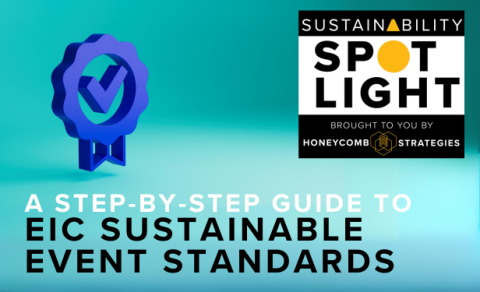A Step-by-Step Guide to Achieving EIC Sustainable Event Standards Certification

Exclusively sponsored by Honeycomb Strategies.
Thinking of a sustainability certification? Many events and venues are. Certifications legitimize your organization’s efforts, and there are many worthwhile programs to consider. One notable and popular program, the Events Industry Council's (EIC) Sustainable Event Standards assess organizations in detailed, points-based criteria and awards applicants with a Bronze, Silver, Gold or Platinum rating for their percentage of compliance. Events, venues, general service contractors, vendors/suppliers can certify, with slightly different criteria for each type of organization.
Stephanie Jones, CAE, CMP, Managing Director at Water Environment Federation (WEF), certified its flagship event WEFTEC as EIC Gold in 2023 because EIC certification aligned with WEF’s mission and priorities of their membership. She was attracted to EIC’s in-depth assessment because “it’s not just about environmental sustainability, the standards address the three pillars of sustainability – people, planet and purpose.”

For those curious about certifying but unsure about what it entails, here’s a step-by-step process that Honeycomb Strategies recommends for pursuing certification:
Step 1: Identify the Team
Designate someone to spearhead the certification. For many event planners, this means bringing in an outside consultant who has the expertise and bandwidth to focus solely on the certification process. This party contacts the third-party assessor, iCompli, who adjudicates on behalf of the EIC. They will provide your team with an Excel file scorecard and grant access to a Microsoft OneDrive folder for uploading documentation. Throughout, liaise with iCompli to get clarification on any items or on the suitability of your documentation.
Step 2: Foundations Certificate
Start by obtaining the EIC Foundations Certificate, a high-level evaluation of several criteria accompanied by a fee that establishes baseline requirements. These operational procedures include a published anti-human trafficking policy and annual sustainability training.
Step 3: Inventory and Assess
Go through the standards and identify your easy wins: what you already have in place, and which criteria are required. Next, look at what your team would be able to achieve in the upcoming event cycle. We recommend starting this process at least three months before the event to have time to make adjustments or start new programs.
Jones said that early review of the standards influenced procurement for WEFTEC 2023, an area of event planning that hadn’t previously been a priority. They authored a policy, selected vendors, and shared best practices with exhibitors, which garnered valuable points toward Gold level.
Step 4: Plan and Implement
For areas you do not yet meet criteria, lay out a roadmap for getting to compliance. It’s important that your team makes meaningful but achievable changes, not biting off more than you can chew during one cycle. Otherwise, changes run the risk of being left by the wayside next year if they are too costly, time-consuming or cumbersome.
For WEFTEC, a large component for implementation in 2023 was waste minimization and diversion. “After going through the EIC process and learning just how much waste is left behind, and the impact on our carbon footprint, WEF set a new goal to move towards a zero-waste event,” Jones said.
Step 5: Organize and Submit
Bring internal team members and external stakeholders into the loop as early as possible. Jones admitted that for the whole process, “the biggest challenge is communicating the requirements out to your vendors and partners, collecting the required proof and making sure they’re doing what they’re supposed to do. That’s the biggest lift.” The programs can’t happen without buy-in, and certification won’t happen without the burden of proof from these folks that new plans were followed through.
Step 6: Review and Award
iCompli and EIC will review your materials and go back-and-forth with your representative on any revisions, explanations or additional documentation needed. By this point, you won’t be surprised about the level of certification you’re on track for, but it still feels great to receive that final confirmation of your achievement!
The Payoff
The validation, publicity and accolades that accompany certification are huge incentives for making sustainable changes. You add value by undergoing assessment and pursuing changes that align with your mission. While EIC certification is an undertaking, with the correct team, time and planning, it may be a worthwhile investment to meet your sustainable goals.
Honeycomb Strategies specializes in impactful solutions for sustainable events, sports, and venues. hcsustainability.com / hello@hcsustainability.com


Add new comment